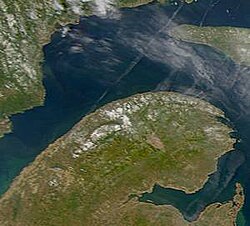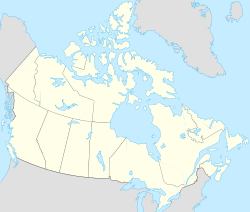Gaspé Peninsula
| Gaspé Peninsula | |
|---|---|
| Region | |

NASA satellite image of the Gaspé Peninsula. Part of Anticosti Island appears to the northeast.
|
|
| Coordinates: 48°39′29″N 65°45′10″W / 48.65806°N 65.75278°WCoordinates: 48°39′29″N 65°45′10″W / 48.65806°N 65.75278°W | |
| Country |
|
| Province |
|
| Area | |
| • Land | 31,075.36 km2 (11,998.26 sq mi) |
| Population (2011) | |
| • Total | 140,599 |
| • Density | 4.5/km2 (12/sq mi) |
The Gaspésie (official name), or Gaspé Peninsula, the Gaspé or Gaspesia, is a peninsula along the south shore of the Saint Lawrence River to the east of the Matapédia Valley in Quebec, Canada, that extends into the Gulf of Saint Lawrence. It is separated from New Brunswick on its southern side by the Baie des Chaleurs (Chaleur Bay) and the Restigouche River.
The origin of the name "Gaspé" comes from the Mi'kmaq word gespe'g, meaning "end", referring to the end of the land. A Basque linguist has instead suggested "Gaspé" comes from a mutation of the Basque word "geizpe", meaning "shelter", however this view is disputed.
The Gaspé Peninsula is slightly larger than Belgium, at 31,075 square kilometres (11,998 sq mi). The population is 140,599 as of the 2011 census.
Sea cliffs dominate the peninsula's northern shore along the St. Lawrence River.Cap Gaspé, jutting into the Gulf of St. Lawrence, is the easternmost point of the peninsula. Percé Rock (or Rocher Percé), an island pierced by a natural arch, is located just offshore of the peninsula's eastern end. The peninsula's interior is a rugged northward continuation of the Appalachian Mountains called the Chic-Chocs, with Mont Jacques-Cartier at 1,268 metres (4,160 ft) the peninisula's highest peak.
Mount Albert (Mont Albert) at 1,151 m (3,776 ft) is another high mountain in the Chic-Chocs. Its summit, an alpine area above the tree line, is a nearly flat plateau about 13 km (8 mi) across composed of serpentine bedrock and supporting a quite unusual flora. The ascent of Mount Albert from near sea level is challenging, but popular with hikers, offering a view of the St. Lawrence and the Côte-Nord, the river's north shore, part of the ancient bedrock of the Canadian Shield.
...
Wikipedia


